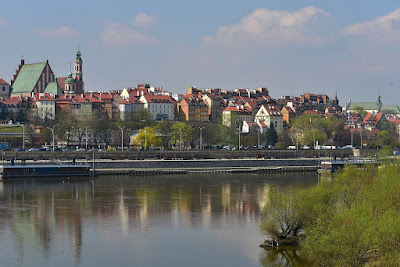Virtual Cultural Tourism: A New Departure
For the past eight months, in common with most of the population of Britain and Europe, I have been in one of several states of "lock-down." I have not been "furloughed" (a word that I was unlikely to have used in any context a year ago), but have continued with my research, my writing, and my teaching, albeit that the latter has had to take place almost exclusively online. My social life has been greatly curtailed: happily, my wife and I have one another, but we have had hardly any contact with friends or family that has not relied on some form of technology, whether the electronic media of Skype and Zoom, or the tried and tested combination of ink, paper, and sealing wax.
One thing that I know many of us have been missing is travel. I was booked to speak at a literary festival in Abergavenny in the Spring, but this was one of the first events to be cancelled, following the arrival, in the United Kingdom, of COVID-19. Having spent our honeymoon in Genoa last year, Melvina and I had been looking forward to a week in Rome this Autumn, but this, too, had to be cancelled. Even if the New Year offers the prospect of a vaccine, any travel plans we might hatch are likely, in the short-term, at least, to be scuppered by that other great source of uncertainty, Brexit. I don't doubt that things will have sorted themselves out within a year or two, but that's a long time to wait, when none of us is getting any younger.
It was in this context that several of the people who have been my students over the past months asked me whether I might put together some "virtual cultural tours," and what began, over the summer, as a casual suggestion, is now a fully fledged business proposition. Our first destination is Poland, beginning on the 21st December. If you think that you might like to join us, please read on.
The Heart of Central Europe.
A Virtual Tour of Poland.
Gdansk, Warsaw, Krakow.
 |
| The Old Town of Warsaw from the Vistula. Photo: Adrian Grycuk (licensed under CCA). |
A virtual tour (delivered online, via Zoom) over four days (4 sessions = 8 hours), led by Dr Mark Patton.
December, 2020.
Fee: £50.
The virtual tour will follow the course of the River Vistula, from its estuary, on the Baltic Sea, at Gdansk, through Grudziadz, Bydgoszcz, Warsaw, Sandomierz, &Krakow, and beyond, to its source, in the Carpathian Mountains.
 |
| The drainage basin of the Vistula. Image: kmusser (licensed under CCA). |
Each session will be two hours in length, inclusive of a short break in the middle. Each will begin with an illustrated outline of a specific period, or theme, in Polish history, which will be followed by a virtual tour of a particular place, or group of places.
Monday 21st December, 10.30-12.30: Introduction to the tour; tour of Gdansk.
Tuesday 22nd December, 10.30-12.30: Poland in the Middle Ages (1000 AD- 1472); tour of Grudziadz, Bydgoszcz, Torun, & Plock.
Monday, 28th December, 10.30-12.30: The Polish "Golden Age" (1473-1648); tour of Warsaw & Sandomierz.
Tuesday, 29th December, 10.30-12.30: A History of the Jewish Diaspora in Poland; tour of Krakow.
 |
| Krakow's Wawel Castle from the Vistula. Photo: EIGENWERK (licensed under GNU). |
For further information, or to join the tour, please send an email: markapatten@btinternet.com.
Mark Patton studied at Cambridge, and completed his PhD at University College, London. he has taught at the Universities of Wales, Greenwich, and Westminster, and currently teaches at The Open University. He is the author of several published books in the fields of archaeology, history, and historical biography; and of three historical novels. For further information on his historical writing, please see our sister site, "Time Present and Time Past".
 |
| The Vistula in southern Poland, with the Silesian Beskid hills in the distance. Photo: Marek & Eva Wojciechowscy (licensed under GNU). |
Comments
Post a Comment